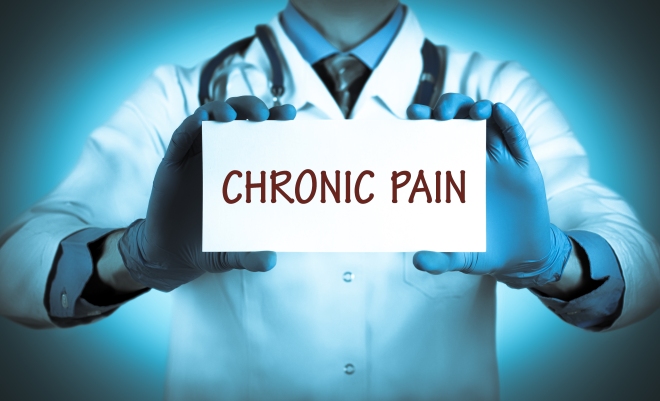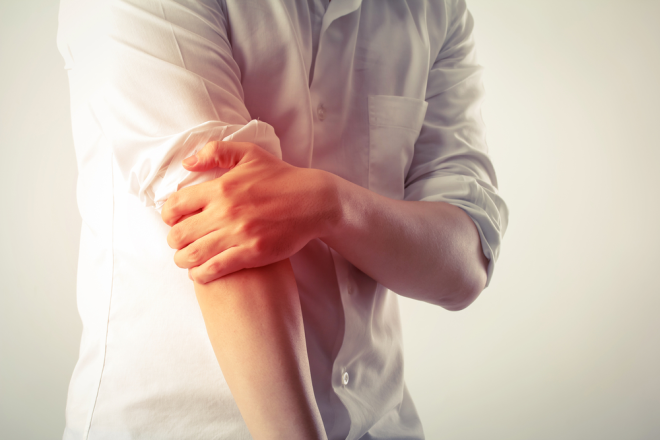Pain is a normal reaction of our body to illness or injury. Pain is a warning that there is something wrong in your body. But sometimes pain continues to exist long after its cause even disappears. When any pain lasts for 3 months or more it is called chronic pain. Sometimes the pain is normal. If you have recently had surgery, injury or illness this type of pain-usually disappears by itself. But if the pain is intense, continuous or it makes you unable to do your regular activities then it can be chronic. In that case, you should seek a doctor’s opinion as soon as possible.

Chronic pain may limit the movements of the sufferer and also decrease strength, stamina, and flexibility. Chronic pain management is tough but not impossible. Chronic pain is not just a long term pain but it is accompanied by anxiety, depression and many more problems. Chronic pain can affect the people of all ages and both sexes but it is most common in women. People with mental health disorders and major depression are more likely to get chronic pain.
Causes of chronic pain:
The exact cause of chronic pain are unknown. Chronic pain often starts with a painful condition or injury such as:
-
Back pain
-
Arthritis or other joint problems
-
Nerve damage
-
Cancer
-
Broken bones
-
Fibromyalgia (muscle pain)
-
Repetitive stress injuries
-
Headaches
-
Lyme disease
-
Ulcers
-
Acid reflux
-
Muscle sprains and strains
-
Irritable bowel syndrome
-
Inflammatory bowel disease
-
Endometriosis
-
Surgery
Symptoms of chronic pain:

Chronic pain affects emotions, physical health and even social life of the patient over time. Common symptoms include:
-
Depression
-
Anxiety
-
Irritability
-
Poor sleep
-
Guilt
-
Loss of job
-
Suicidal thoughts
-
Family or Relationship issues
-
Alcohol or drug abuse
-
Loss of interest in sex
-
Tired or wiped out feeling
Common pain management techniques:
-
Physical therapy
-
Occupational therapy
-
Psychological counseling
-
Biofeedback
-
Nerve blocks
-
Braces
-
Relaxation techniques
-
Pain medications
-
Surgery to treat the condition causing pain
Chronic pain medications:
Chronic pain medications can provide you effective pain relief but they do not treat your pain. Long term use of pain medications can make you dependent on them and may also cause possible side effects. It is better to take a bit of advice from your doctor before taking any pain medications. Some patients take more pain medications to manage their pain which can make them dependent on these medications.
Common pain medications which can help you manage your chronic pain are:
Opioids: Strong pain medications. They can provide you relief if you have pain due to broken bone, surgery or cancer.
Over the counter medicines: Naproxen (Alec’s and generic), ibuprofen (Advil, Motrin IB, generic), and acetaminophen (Tylenol and generic). These medications build up in the blood and fight inflammation to provide general pain relief.
Antidepressants: These can improve function and relieve pain. These can be used to treat chronic pain due to fibromyalgia, arthritis and nerve damage. Some examples are amitriptyline, duloxetine, sertraline, and fluoxetine.
Anticonvulsants: It may help relieve pain such as low back pain. Some anticonvulsants are topiramate, pregabalin, gabapentin, and phenytoin.
Chronic pain management tips which can effectively help you cope with it:
Meditation or deep breathing techniques to relax your body. It releases tension and tightness from the body and helps ease the pain.
Manage your stress. Stress and anxiety can intensify chronic pain. Learn stress releasing techniques.
Regular exercise strengthens muscles and prevents reinjuries and also make your body release endorphins. These are brain chemicals that block pain signals.
Avoid alcohol and smoking. Alcohol can worsen sleep issues. No alcohol and smoking policy can boost your chronic pain management efforts.
Massage can help relieve tension and reduce stress. Neck and back pain sufferers can take maximum benefits from massage.
Eating a healthy and well-balanced diet aids your digestive process and improves overall health. Proper diet can also maximize your chronic pain management treatment.
Try to distract yourself from pain. Make some efforts not to focus on your pain. Keep doing some activities which you love to do. It keeps you busy and distracts your mind.
Effective and non-invasive treatments for chronic pain:
Physical therapy is an effective technique to relieve chronic pain. It helps improve movement and function. Physical therapy is one of the best options you can choose when you have chronic pain. It can help you function and feel better. Physical therapy involves stretching exercises, strength exercises, pain relief exercises and low impact aerobic training. Your physical therapist may also use heat and ice packs, transcutaneous electrical nerve stimulation, ultrasound and massage. The goal of physical therapy is to decrease pain, improve your function and mobility and make you feel better.
-
Psychological treatment: Chronic pain may also lead to a feeling of despair, sadness, anger, and hopelessness. Pain can alter your personality, affect your sleep and interfere with your relationships and works. As a result lack of sleep, stress, anxiety, and depression can make your pain worse.
Psychological treatment offers a safe and no-drug way to treat your pain directly by reducing the psychological stress which often aggravates pain. Psychological treatment involves psychological counseling and helps patients acquire skills and techniques to manage chronic pain.
-
Acupuncture: It is the oldest healing art. It appears to be a reasonable and effective option for chronic pain patients. Acupuncture decreases the pain by boosting the release of endorphins (that block pain). Acupuncture can be very effective in chronic pain management along with other pain management techniques.
-
Chiropractic treatment: It is the most common pain treatment. It is effective for treating chronic neck and back pain. Chiropractic can help alleviate chronic symptoms and also may correct underlying dysfunction. The goal is to help reduce pain and manage their pain better.
-
Massage: Massage is popular among patients suffering from chronic pain. Massage can relieve tension and stress by increasing blood flow. It can also reduce the substances that may generate and sustain pain.
Conclusion
Chronic pain can be confusing and dealing with it can leave you and your doctor perplexed. Chronic pain can take a toll on your self-esteem and make you feel frustrated, anxious and angry.
Chronic pain may lead to long term lack of physical activity. It can impact your emotional, psychological, neurological, cardiovascular and musculoskeletal processes. It requires a combination of therapies to enable you to live a pain-free and normal life. Alternative therapies like acupuncture, nutritional supplements, chiropractic care, massage, meditation, and biofeedback can help manage chronic pain.
Thanks for the additional detail. It sounds like you have a viable solution. I’m glad you shared your particular instance it was a wonderful thought exercise for me. For more info visit Papergy .
LikeLike